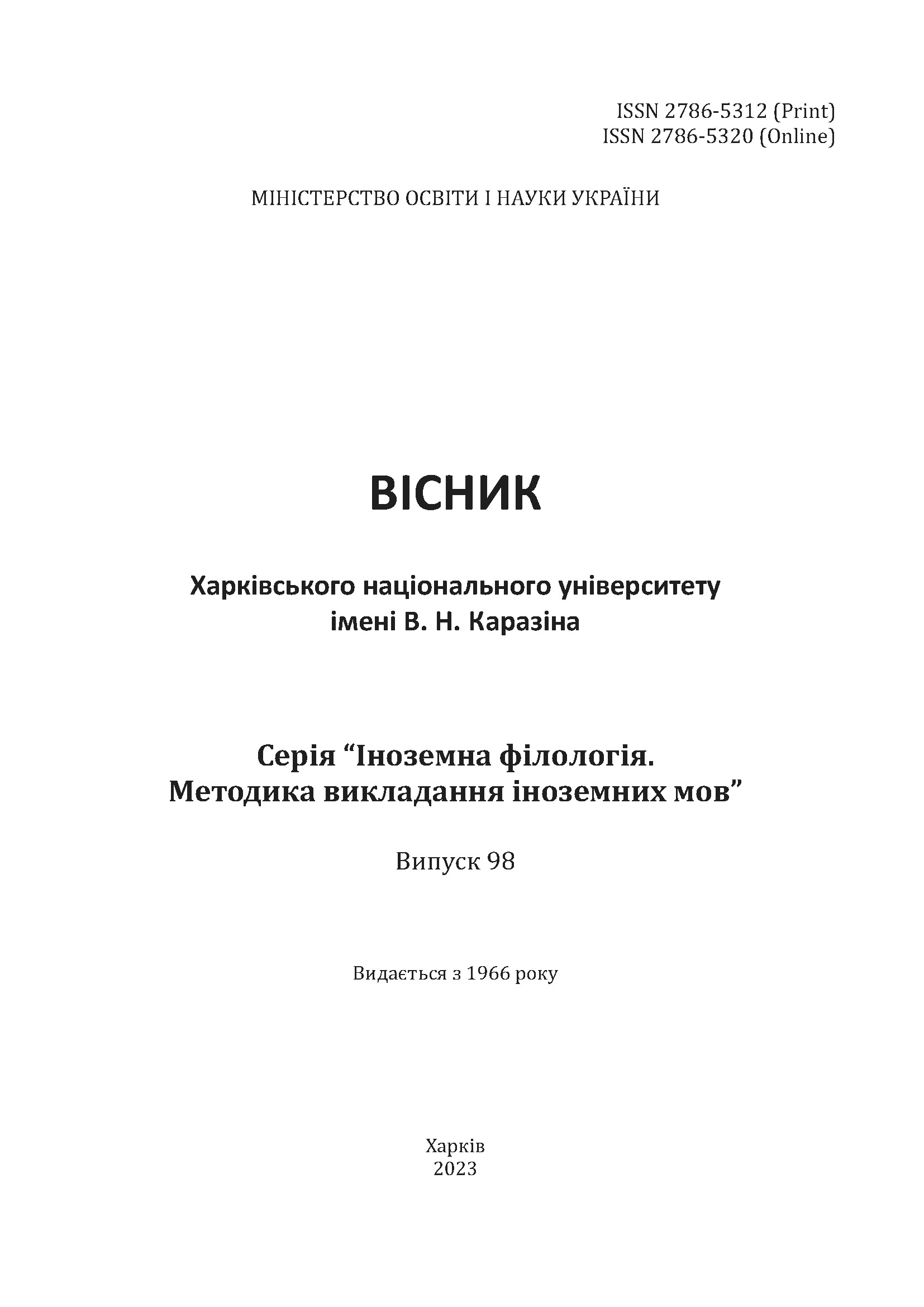Multimodal metapragmatics of German advertising discourse
Abstract
The article analyzes metacommunicative utterances in German advertising discourse, which proves the possibility of integrating metapragmatics with multimodal pragmatics. Metapragmatics studies metacommunication, i. e. the organization and management of speech interaction by means of linguistics. Multimodal pragmatics focuses on the properties of linguistic units in discourse types, which are based on the combination of several sensory and communicative modes. Multimodal metacommunicative utterances use combination of several sensory and communicative modes to express meanings regarding the course of communication itself. German advertising discourse shows two types of metacommunicative utterances according to the criterion of authorship: protagonist’s and advertiser’s comments. The protagonist’s comments are about his speech act and about himself. The advertiser’s comments are about the protagonist, utilitarian information, image and product quality. Metacommunicative utterances can be placed in almost all structural parts of the advertising text: visual context, title, subtitle, main text, slogans, enter utilitarian information and be integrated into the product image or logo. Serving as a local strategy for attracting and maintaining contact with the recipient, metacommunicative utterances belong to perlocutionary intensifiers, which aim to increase their influence on him in order to achieve perlocutionary success – to encourage the recipient to buy a product or use a service. At the same time, a discursive act of metacommunicative contactive is realized, which can be explicit or implicit. The indicating devices of its explicitness are: lexemes of locutionary, illocutionary, perlocutionary and epistemic semantics; prepositions, pronominal adverbs and pronouns that correlate in terms of content with the previous or following utterances; graphic means of direct speech. If such indicating devices are not available, the metacommunicative utterance implements an implicit metacommunicative contactive, where the metacommunicative component of meaning is contained in the implicature. From a structural point of view, metacommunicative utterances are declarative, exclamatory, imperative and interrogative sentences, as well as parenthetical phrases.
Downloads
References
Bezuhla, L. R. (2020). Teoretyko-metodolohichni zasady linhvoprahmatychnykh doslidzhen dyskursu [Theoretical and meth¬odological foundations of linguistic and pragmatic research of discourse]. Vid slova do dila: linhvoprahmatyka dyskursu [From word to action: linguistic pragmatics of discourse]. (pp. 16–75). Vinnytsia : Nova Knyha Publ. (in Ukrainian)
Bezuhla, T. A. (2017). Anhlo- i nimetskomovnyi reklamnyi dyskurs: polikodovyi linhvoprahmatychnyi pidkhid (Avtoreferat kan¬dydatskoi dysertatsii) [English- and German-language advertising discourse: polycode linguopragmatic approach (Philology PhD thesis synopsis)]. Kharkivskyi natsionalnyi universytet imeni V. N. Karazina, Kharkiv. (in Ukrainian)
Boettcher, W. (1975). Metakommunikation. Didaktische überlegungen zum problem gestörter kommunikation im deutschun¬terricht. Diskussion Deutsch, 24, 379–398.
Bublitz, W., & Hübler, A. (2007). Introducing metapragmatics in use. Metapragmatics in use. (pp. 1–26). Amsterdam: Benjamins.
Burger, H. (2005). Mediensprache. Eine Einführung in Sprache und Kommunikationsformen der Massenmedien. Berlin, New York: de Gruyter.
Busch, F., Droste, P., & Wessels, E. (2022). Sprachreflexive Praktiken: empirische Perspektiven auf Metakommunikation. Berlin, Heidelberg: Springer.
Caffi, C. (1994). Metapragmatics. The Encyclopedia of Language and Linguistics. (pp. 2461–2466). Oxford: Pergamon Press.
Dieckmann, W. (2005). Streiten über das Streiten: normative Grundlagen polemischer Metakommunikation. Tübingen: Niemeyer.
Forceville, Ch. J., & Urios-Aparisi, E. (2009). Multimodal Metaphor. Berlin, New York: Mouton de Gruyter.
Hinrichs, U. (1991). Linguistik des Hörens: Hörverstehen und Metakommunikation im Russischen. Wiesbaden: Harrassowitz.
Jakobson, R. (1981). Linguistics and Poetics. Roman Jakobson. Selected writings. 3: Poetry of Grammar and Grammar of Poetry. (pp. 18–51). Paris, New York: Mouton.
Kravchuk, N. P. (2003). Reklamnyi tekst yak frahment dyskursu ta odynytsia komunikatsii (aksiolohichnyi aspekt tekstu) [Advertising text as a discourse fragment and unit of communication (axiological aspect of a text)]. Problemy semantyky slova, rechennia ta tekstu [Problems of semantics of a word, sentence and text], 9, 168–171. (in Ukrainian)
Kryvoruchko, S. I. (2011). Linhvoprahmatychni vlastyvosti perlokutyvnykh optymizatoriv u suchasnomu nimetskomovnomu dyskursi (Avtoreferat kandydatskoi dysertatsii) [Linguistic and Pragmatic Properties of Perlocutionary Optimizers in Modern German Discourse (Philology PhD thesis synopsis)]. Kharkivskyi natsionalnyi universytet imeni V. N. Karazina, Kharkiv. (in Ukrainian)
Martyniuk, A. P. (2009). Dyskursyvnyi instrumentarii analizu anhlomovnoi reklamy [Discursive instrumental analysis of English advertising]. Linhvistyka XXI stolittia: novi doslidzhennia i perspektyvy [Linguistics of the XXI century: new preliminaries and perspectives]. (pp. 159–167). Kyiv: Lohos Publ. (in Ukrainian)
Matiukhina, Yu. V. (2004). Rozvytok systemy fatychnoi metakomunikatsii v anhliiskomu dyskursi XVI–XX st. (Avtoreferat kan¬dydatskoi dysertatsii) [The Development of the Phatic Metacommunication System in the English Discourse of the 16th- 20th cc. (Philology PhD thesis synopsis)]. Kharkivskyi natsionalnyi universytet imeni V. N. Karazina, Kharkiv. (in Ukrainian):
Meyer-Hermann, R. (1976). Metakommunikation. Linguistik u Didaktik, 25, 83–86.
Moiseienko, I. P. (1996). Prahmalinhvistychna orhanizatsiia reklamnoho tekstu: makro- i mikroanaliz (na materiali anhlomov¬noi pobutovoi reklamy) (Avtoreferat kandydatskoi dysertatsii) [Pragmatic and linguistic organization of an advertising text: mac¬ro- and microanalysis (on the material of the English-language household advertising) (Philology PhD thesis synopsis)]. Kyivskyi derzhavnyi linhvistychnyi universytet, Kyiv.
Schwitalla, J. (1979). Metakommunikation als Mittel der Dialogorganisation und der Beziehungsdefinition. Arbeiten zur Konversationsanalyse. (S. 111–143). Tübingen: Niemeyer.
Völzig, P.-L. (1979). Begründen, Erklären, Argumentieren: Modelle und Materialien zu einer Theorie der Metakommunikation. Heidelberg: Quelle und Meyer.
Weber, P. (1997). Kommentierung und Ankündigung von Sprechhandlungen: Metakommunikative Strukturen im russischen dramatischen Text. München: Sagner.

This work is licensed under a Creative Commons Attribution 4.0 International License.




